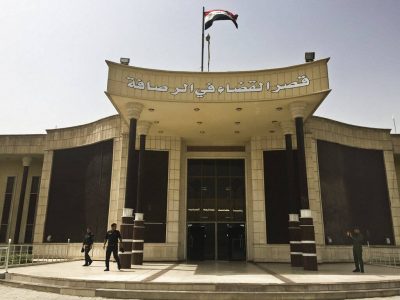
Iraqi authorities uphold death sentences against five Islamic State terrorists
The Iraqi judiciary sentenced five ISIS terrorists to death for carrying out terrorist operations in al-Anbar and Saladin in recent years.
The Supreme Judicial Council media unit issued a statement indicating that al-Karkh Criminal Court sentenced terrorist Ammar Mahdi al-Jubouri to death by hanging in accordance with the Counter-Terrorism Law.
The statement said Jubouri was an ISIS leader in Fallujah and participated in the Albu Nimr massacre, which killed 17 civilians. He also confessed to participating in many terrorist operations.
In November 2014, ISIS carried out a massacre against the Albu Nimr tribe in the Heet district of Anbar, western Iraq, accusing them of collaborating with the authorities.
Jubouri had escaped Abu Ghraib prison in July 2013, after terrorists stormed the facility and released about 500 prisoners, most of whom were prominent leaders in the al-Qaeda organization. They killed around 20 security guards.
The Judicial Council explained that Jubouri was assigned a leadership position after the terrorist organizations invaded a number of Iraqi regions in 2014 and that he fled after the liberation using a fake passport until he was arrested by Egyptian authorities and turned over to Iraq.
Meanwhile, the Criminal Court of Saladin handed down death sentences against four convicts accused of participating in the detonation of a car bomb near a gas station in Tikrit.
The Judiciary Council said the explosion targeted the commander of Saladin regiments, which led to the death of a citizen and the injury of the commander, and 33 of his security guards.
Human Rights Watch (HRW) and other human rights organizations have condemned the Iraqi government for issuing death penalties.
Last January, President Barham Salih approved 340 death sentences, sparking widespread political and human rights controversy.
International human rights organizations often question the Iraqi judicial system and the political motives behind most of the verdicts issued on terrorism charges.
United Nations High Commissioner for Human Rights, Michelle Bachelet said earlier this year that Iraq is witnessing repeated violations of the right to a fair trial and effective legal representation, with accusations of torture and ill-treatment.
Source: Aawsat





